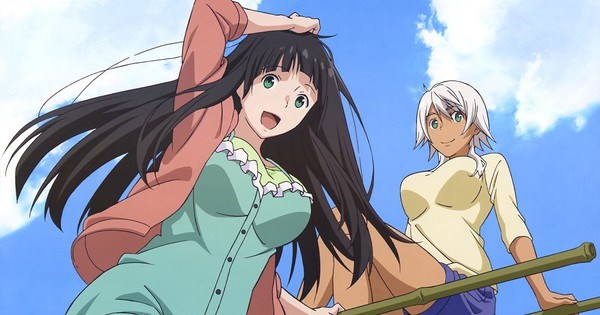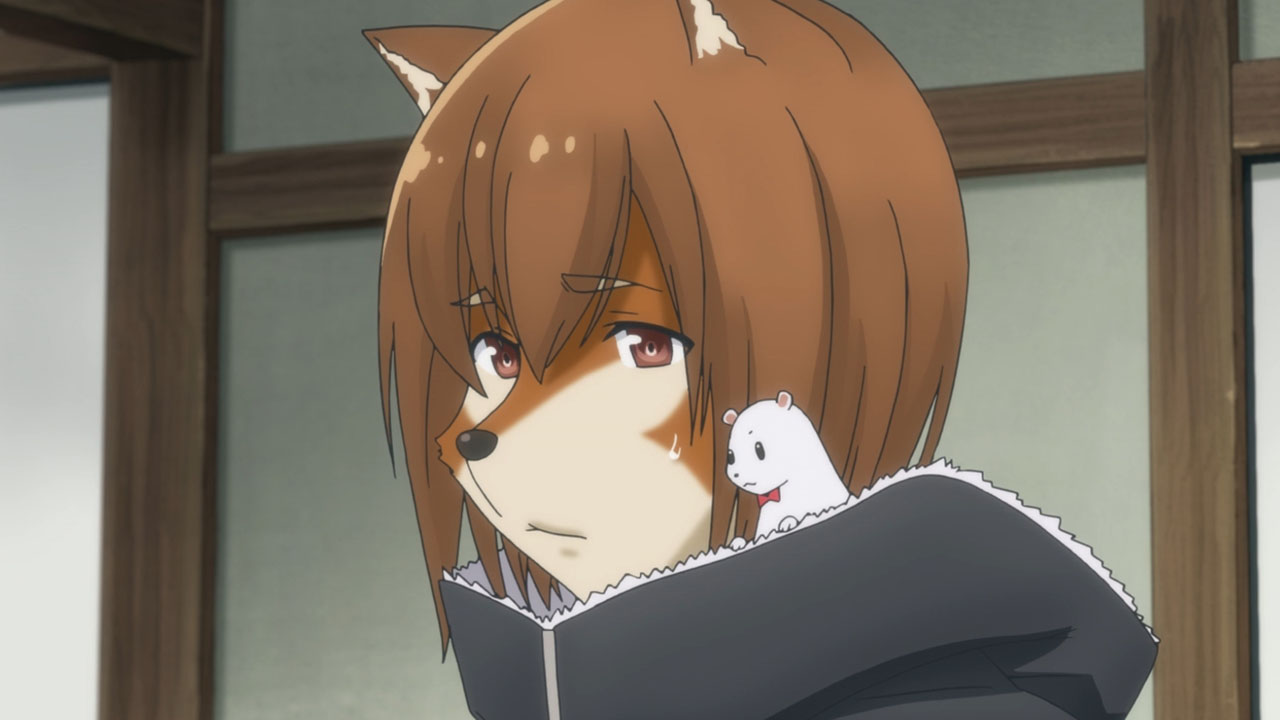
Written by Richard Durrance on 24 Jun 2021
Distributor Crunchyroll • Certificate NA • Price NA
I was probably in one of my minimal anime phases when Flying Witch aired in 2016, but randomly saw it mentioned as a slice of life that manages to balance magic and the real world in a way that was natural and just having watched the deeply disappointing and vastly generic WorldEnd (which also had good reviews though for different reasons, which I find utterly baffling) I considered this might be just the tonic.
Random though not so random aside:
I’m terrible at remembering names, I’d forget my own if my mum still didn’t sew it into my clothes, but after finishing the 12 episode run of Flying Witch I remembered almost everybody, which rather suggests that they left something of a mark on my memory. But you probably want an idea of what this is all about and being a generous mood, I’ll oblige.
Fledgling witch, Makoto - and her cat familiar Chito - travel north to stay with her aunt and uncle as an expected part of her witch training. There she gets to grips with her new environment, new friends and the everyday of life.
You can’t really say much more about Flying Witch because for the most part not a great deal happens. In another series this would be the absolute death of it but Flying Witch manages to almost raise it to the level of virtue. It’s a slice of life without the drama. Again that should be the absolute death but somehow Flying Witch manages to be quietly fascinating at times. I struggle to imagine many other series that could happily concentrate half an episode on Makoto’s much younger cousin, Chinatsu, just following Chito, the black cat, through the streets. Yet Flying Witch does this and gets away with it. In part because the sound, the music is very precise – music is set to action almost like a silent film at times, just not so potentially intrusive. And everything feels very deliberate, almost as if every gesture, every nuance has been thought through with immense care. Through most of the series Makoto is joined by her elder sister, and much more experienced witch, Akane. Akane, at one point, sends messages via paper cranes and just the way cranes squeeze through doors, float down onto sleeping foreheads, you feel like every part of that animated motion has been carefully, thoughtfully considered and animated just so. Similarly, every motion that the cat Chito seems to make, it feels deliberate and something about that deliberateness is almost charming. If this seems an odd or trifling observation, it’s because I felt that much of the success of Flying Witch is in the tiny detail and stands or falls on whether you find that detail entrancing. Whether this is Chinatsu following Chito to a pile of who-knows-what or our protagonists sitting in a ghost café people watching, Flying Witch manages to make it entertaining.
Yet what I enjoyed most was how the series managed to balance out all its various elements, especially the magical with the everyday. Magic and being a witch is both hidden but also part of the world we find ourselves watching. Makoto’s family know all about magic and witches, to others it’s a mystery. Yet it’s never scary to anyone (though at one point, Makoto’s elder cousin Kei is scared of a ghost though never in a slapstick manner) or disbelieves magic or witches exist. Makoto’s new friend, Nao, when first seeing Makoto ride on a broomstick is surprised to find witches exist but then is immediately accepting of it – Nao seems to treat it as an act of wondrousness not as something to be nervous about. Interestingly, though Makoto has left home specifically to train, we rarely see her act the witch, see her perform magic, and sometimes we even learn the fruit of her training without ever seeing her training. Again, there’s something in how this is done that could be an absolute disaster. But it balances what’s seen and what we later will learn. Yes, there are episodes where Akane actively trains Makoto, though normally Akane just sleeps in the sunshine (when not travelling, Akane seems about the laziest person alive). At the same time, we’re also quietly yet consistently reminded throughout the series that this other magical world exists, whether because of a random visit by The Harbinger of Spring (yes, literally) or by Inukai, who has an unfortunate dog problem (be careful what chocolates you eat whilst drunk people). It’s all part of the world in which Makoto lives. There is a hint of the Miyazaki about it, but mainly a hint; I never felt this was trying to be a Kiki’s Delivery Service just a little older.
The characters, too, were nicely distinct and there was a refreshing lack of any form of love story crowbarred into the story, as often there can be. Even when someone mistakes Nao for Kei’s girlfriend they are both a bit embarrassed, there is no suggestion that they are anything other than friends. Kei, also, was an intriguing character because he’s quite domestic, more likely to be doing the cooking: picking herbs then feeding his cousins or Chinatsu than be off out with his mates doing out of tune karaoke. Chinatsu being young is energetic and in part fascinated with her witchy cousins, but never overly boisterous, if anything, there’s a bit of Kei about her, in just as Kei is happy cooking and growing vegetables (they live on a farm) when Chinatsu becomes interested in witchyness it’s not some childish dilettante behaviour though she definitely evinces child-like wonder at times. Chinatsu genuinely seems to find life exciting and mystery in the simple things; before she follows Chito on his stroll about town, she calls out to her mum that she’ll be back before lunch; then in answer to where she’s going, Chinatsu honestly replies that she has no idea but it’ll be awesome. Yes, Chinatsu is following a witch’s familiar but you feel that’s immaterial, life is thrilling and full of wonder for her. Makoto is introduced as having a terrible sense of direction – though her familiar, Chito, is the prrrfect (sorry!) GPS – something that could be overplayed for laughs, but instead is managed as just another facet of her personality. As protagonists go, she is a gentle one and perhaps not the most likely to win awards, but as the central point around which the various character pivot – she’s charmingly spot-on.
The animation though not likely to blow anyone away pleasingly reflects Kei and Chinatsu’s home town. It’s quietly lovely and well-drawn. Nothing you are going to see is overly stylised, though when needing to – the whale for instance (the whale? you ask), it again channels a little of the wonder of Miyazaki. Attention seems instead to have been paid to character design. Kei, Chinatsu and their parents all look to be part of the same family. They are distinct but I liked how the character designers appeared to have gone that bit further in ensuring they all share hereditary traits while keeping each one distinct. Definitely no one looks like they came straight out of a: My First Manga primer (unlike WorldEnd, where they did).
Overall, Flying Witch walks the difficult tightrope of making the everyday seem magical and what is magical part of the everyday. Perhaps as a series it never quite soars, never quite achieves greatness but is nevertheless a gentle, quietly humane, yet magical slice of life. There is plenty of humour but it’s never slapstick, never overplayed, just as the drama is quietly underplayed. Again, all of these are strengths in my book. There are enough series out there which go overboard on the humour, and restraint in all things is what really makes Flying Witch work. A punchline is likely to raise a wry, off kilter smile than an outright laugh but that’s the nature of the series, it’s a little bit off kilter though everything is recognisable.
Though apparently it was due a UK release from Animatsu, maybe due to their absorption by Manga I cannot find evidence of one ever happening though it’s still available where I found it on Crunchyroll.

Evidence of aforementioned unfortunate dog problem.

Long-time anime dilettante and general lover of cinema. Obsessive re-watcher of 'stuff'. Has issues with dubs. Will go off on tangents about other things that no one else cares about but is sadly passionate about. (Also, parentheses come as standard.) Looks curiously like Jo Shishido, hamster cheeks and all.
by Richard Durrance on 20 Feb 2026
by Ross Locksley on 19 Feb 2026
by Ross Locksley on 08 Feb 2026
by Ross Locksley on 25 Jan 2026
by Ross Locksley on 01 Jan 2026
by Ross Locksley on 21 Dec 2025
by Ross Locksley on 25 Nov 2025
by Ross Locksley on 24 Nov 2025